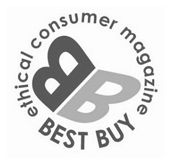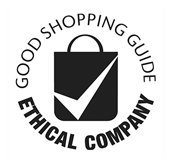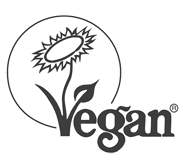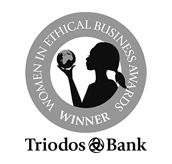Veganuary 2023: how to have a vegan period?
Whether you’ve decided to trial a plant-based diet for Veganuary 2023 or been plant-based for years, going vegan stretches far beyond what you put in your belly.
Whatever the reasons, once you take the leap to veganism it can become a huge learning journey of all sorts of things that you’ve never thought about before. From the clothes you wear, to the cosmetics you use, suddenly everything can come into question. Have you thought about what goes in or near your vagina? And how does going vegan affect your period?
Can a vegan diet affect your period?
Your menstrual cycle is impacted by many things, including the food you eat. It is important to bear in mind that any change in diet can have an impact on your hormone balance and can therefore affect your period.
As with any diet, a varied, balanced approach is key to eating healthily as a vegan, to ensure you are getting all the nutrients and minerals your body needs every day of the month. Vitamin B12, omega 3, protein, zinc, iron and more, are all essential nutrients that can affect the menstrual cycle.
How to increase iron levels on a vegan diet
Iron is key to keeping you strong and healthy. It plays an essential role in the production of red blood cells. So, around and during your period, when you lose iron-rich blood, it is important that you make sure you are absorbing enough iron and eating plenty of foods that are rich in this essential nutrient.
Good sources of iron in plant-based foods are:
- pulses
- wholemeal bread and flour
- breakfast cereals fortified with iron
- dark green, leafy vegetables, such as watercress, broccoli and spring greens
- nuts
- pumpkin and pumpkin seeds
- dried fruits, such as apricots, prunes and figs
Iron contained in plant-based food is absorbed by the body less well than iron from meat. However, it is possible to make sure that you eat a diet high in iron as a vegan.
One way of improving your body’s absorption of iron from plant-based foods is to combine meals with substances rich in vitamin C, such as oranges or orange juice, and avoid caffeinated drinks during meals.
The vegan diet, menstrual cycle and PMS
Will becoming vegan affect your period? There isn’t a lot of research on the subject yet, but some people believe that since becoming vegan they have had lighter periods and reduced period pains, as well as less severe PMS symptoms.
The foods we eat can influence how we feel. There’s anecdotal evidence that removing dairy from your diet can help to reduce PMS symptoms.
The protein in cow’s milk can cause bloating and cramping to some of us, and dairy has been linked to certain inflammatory conditions like acne. On the other hand, a vegan diet is usually high in fruits, vegetables, whole grains, legumes, nuts, and seeds – all of which can help to decrease inflammation in your body.
If you switch to a plant-based diet, it is recommended that you look out for any major changes in your menstrual cycle and know when to consult a medical health professional.
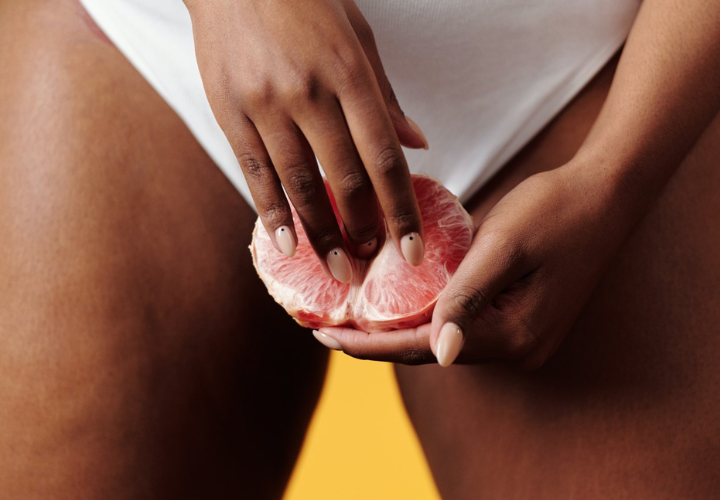
Vegan period products
For many, veganism is not just a diet, it’s a way of life. Beyond the diverse, delicious recipes that you can explore in Veganuary, there are many more vegan lifestyle swaps that are sometimes overlooked, including period products.
Conventional period products aren’t vegan
You might not think that those “sterile” white contraptions used to catch your monthly flow could be harmful to animals in any way. But, sadly, many are.
At the very beginning of the production process, a cocktail of pesticides and herbicides is applied to grow the non-organic cotton that goes into most tampons and pads. They are also bleached to give them their white, sterile appearance.
Inserting something full of chemicals into or next to your intimate area is far from good for your body. Conventional cotton production also accounts for one sixth of all pesticides used globally, which is disastrous for the environment and harmful to insects too.
And then there’s the unfortunate truth of animal testing. Some tampons have been tested on animals, particularly on baboons and rabbits. The tampon(s) is/are inserted either in the animal’s vagina or surgically into their necks and left for prolonged periods to see what happens.
Pads, tampons and their environmental impact
The environmental impact of the plastic waste at the tail end of the product’s journey is often overlooked. Each one of us uses around 11,000 disposable sanitary products in a lifetime, which eventually end up in landfill or the sea.
And there’s more to it than meets the eye… Beyond the visible plastics of wrappers, backing strips and applicators, conventional menstrual products can contain up to 90% plastic within their composition too, polluting our oceans and harming marine wildlife.
And whether these products are flushed down the loo or disposed of correctly, they can still wangle their way into water courses from landfill, breaking up into minute microplastic particles that can end up in the stomachs of sea creatures.
How to choose vegan, cruelty-free period products
So how can you ensure your period is 100% vegan and cruelty-free? There are many period products out there, such as the Mooncup® that are vegan, both in their production process and in their care for the environment at the consumer end.
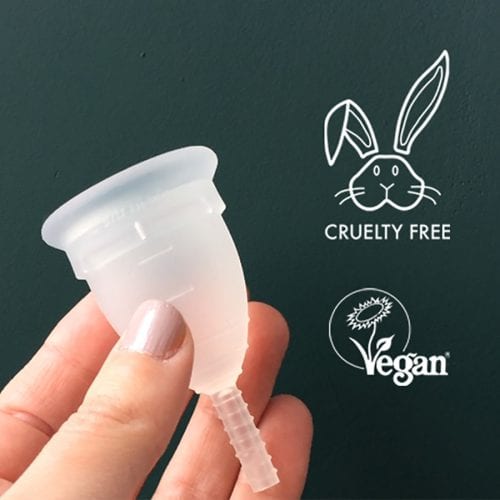
Reusable vegan period products
Reusable menstrual products such as period underwear, material pads, and of course menstrual cups such as the Mooncup, tackle the problem of waste and its environmental impact.
Look out for the Vegan Society trademark and cruelty-free certification on brand websites to ensure they adhere to all the relevant best practices throughout their production line. It is also important to look into where the products are produced and whether they come in plastic packaging. You can read more about how menstrual cups brands compare here.
Biodegradable period products
Certain brands such as Natracare offer disposable pads, tampons and liners made from natural ingredients such as sustainably-sourced wood pulp or organic cotton. Natracare products are vegan and cruelty-free, as well as biodegradable and compostable.
If you do choose to use organic disposables, make sure you still dispose of them correctly, in the bin or compost, to enable them to biodegrade properly.
Why the Mooncup menstrual cup is a truly sustainable choice this Veganuary?
1. The Mooncup® is environmental
Switching to the Mooncup is a simple step to dramatically reduce the waste you produce and your environmental impact. You only need one Mooncup which lasts for years and years. Thanks to Mooncup users worldwide, over 2.6 billion (and counting!) fewer tampons and pads have ended up on our beaches or in landfill since 2002!
Many of the menstrual cups that are flooding the market today are made in China and some even come with plastic packaging. The Mooncup is made here in the UK, and all our packaging is plastic free and recyclable.
We’ve chosen not to add any food colourings or pigments to the Mooncup so we don’t offer a range of colourful cups. You won’t catch us selling unnecessary and waste-creating products such as wipes either.
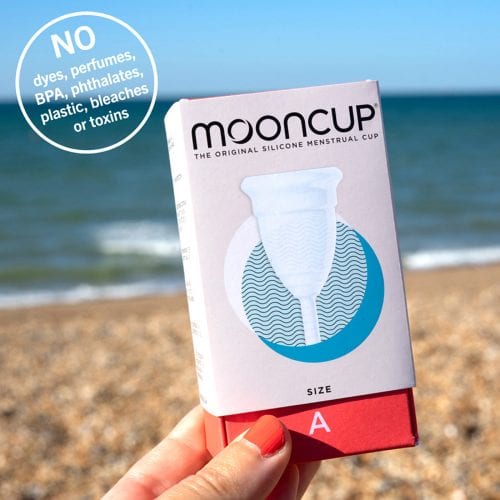
2. The Mooncup is vegan and cruelty-free
The Mooncup menstrual cup has been registered by the Vegan Society since 2010. This indicates that the Mooncup contains no animal ingredients and has never been tested on animals. The Vegan Society Trademark holds very strict standards in relation to animal testing. Only manufacturers who have not tested their products or ingredients, or requested their testing, are able to trademark their products.
3. Mooncup Ltd is an ethical business
Mooncup Ltd is an employee owned business. We were the first sanitary protection manufacturer in the world to be awarded Ethical Business status for our people and environmentally-friendly practices. We’ve also consistently scored as one of The Good Shopping Guide’s top-ranking companies since they started publishing their ethical brand comparison tables back in 2002.
4. The Mooncup is better for your health
When choosing a menstrual cup, it is important to remember that this is a product that will be worn internally so it’s best to pick a high quality cup. Manufactured in the UK, Mooncup® is the world’s first silicone menstrual cup and is a brand synonymous with quality.
Unlike tampons, which absorb 65% menstrual fluid and 35% your natural moisture, the Mooncup menstrual cup is non-absorbent, so it won’t cause dryness or leave fibres behind. It is latex-free, hypoallergenic, and contains no dyes, perfumes, BPA, phthalates, plastic, bleaches, or toxins.
While a sparkly or luminous pink cup may look pretty in the bathroom cabinet, adding pigments or dyes may compromise the health, ethical and environmental benefits that make menstrual cups so great in the first place!
So, whether your reasons are environmental, ethical or for your own health, Mooncup is the sustainable choice.
Find out more about the Mooncup menstrual cup and buy yours here.
If you have any questions about the Mooncup, please feel free to contact us here.
Read more on the Mooncup® blog:
How to choose the best menstrual cup for you
How is the Mooncup® menstrual cup environmentally friendly? 10 reasons
What kind of person uses the Mooncup?


